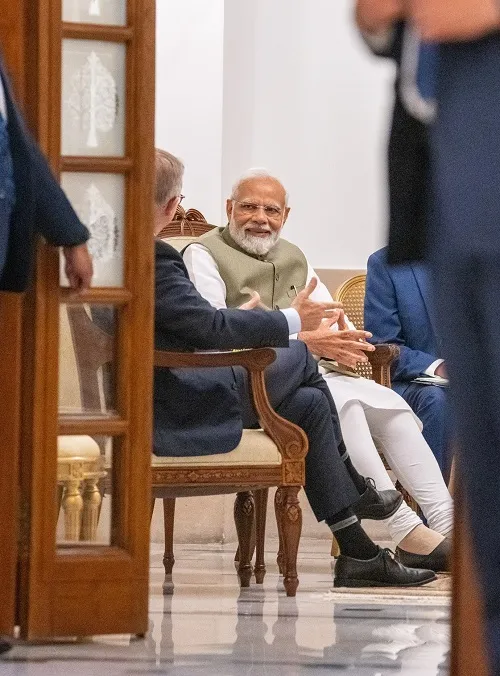

Prime Minister Narendra Modi and Australian Prime Minister Anthony Albanese in New Delhi on Friday (Image courtesy: Twitter/@AlboMP)
Australian Prime Minister Anthony Albanese’s discussions with Prime Minister Narendra Modi during the Annual Leaders’ Summit in New Delhi on Friday zeroed in on specific areas where both leaders would like to see even more collaboration between the two countries, especially clean energy.
It also focused on trade, investment, and economy as well as strategic and security engagement in the Indian Ocean.
As negotiations continue for a full Comprehensive Economic Cooperation Agreement (CECA) — that will open access even further — New Delhi and Canberra vowed to work harder to deepen and diversify trade links and supply chains.
In recognition of a unique part of the economic relationship, both Prime Ministers also discussed the potential presented by the India-Australia Audiovisual Co-Production Agreement. The Agreement will support skilled jobs, creative exchange, and the development of culturally significant screen projects in both countries.
“We are natural partners. Not only in traditional areas but increasingly in newer ones as we seize the opportunities of the transition to net zero, shaping the future rather than letting it shape us,” Albanese said later during his address at the Indian Institute of Technology (IIT) in the Indian capital Friday afternoon.
“So we’re looking at ways to help businesses on both sides of the Indian Ocean benefit from easier access to each other’s markets,” he mentioned further.
Both leaders also discussed comprehensively their shared ambition on climate change and the opportunities presented by the global energy transition, agreeing to build on existing cooperation on solar and hydrogen towards a Renewable Energy Partnership.
A task force has been established to advise the Australian and Indian governments on opportunities to accelerate the rollout of solar PV and clean supply chains. It will be led by Australian solar expert, Professor Renate Egan and eminent Indian scientist Professor Anil Kottantharayil.
During his trip, the Australian PM spotlighted Prime Minister Modi’s “remarkable goal” for India to install 500 gigawatts of renewable energy capacity by 2030 which will have a profound impact on the global energy transition.
The global move to a clean energy economy, he said, is shifting gears quickly.
“To get a sense of what is possible, look at what India has already achieved. Between 2018 and 2021, India increased solar generation by 31 terrawatt-hours. That’s enough power for 24.7 million Indians. Over the next two years, domestic production of solar cells and solar modules in India is expected to more than double,” Albanese told the gathering at IIT.
Considering that Australia is blessed with abundant resources used in the production of renewable energy, he stated that it “makes sense” for both countries to work together so that goals can be reached sooner.
With converged interests, both leaders agreed that deepening cooperation on new and renewable energy can drive new innovation and investment.
“India’s manufacturing scale and huge domestic demand, Australia’s abundance of critical minerals, and our combined research nous, mean there’s plenty of mutual gain,” said Albanese.
“And I look forward to seeing new clean energy projects, particularly on solar and hydrogen, coming to fruition. Because in them, we see one of the substantial foundations on which we can build a better future,” he added.
Right since his government came into power Down Under, Albanese has committed to place India “at the heart of Australia’s approach” to the Indo-Pacific and beyond.
On Friday, both leaders agreed to strengthen the India-Australia defence and security partnership in support of both nations’ shared ambition for an open, stable and prosperous Indo-Pacific.
Australia is hosting Exercise Malabar for the first time this year, building real collaboration with Quad partners India, Japan and the United States.
Education too was a key focus of the Annual Leaders’ Summit with both Prime Ministers welcoming a new agreement that will support mutual recognition of education qualifications, and noted that officials have made significant progress on a new Migration and Mobility Partnership Arrangement. This Agreement will encourage the mobility of students, graduates and professionals and enhance cooperation on irregular migration issues.
Australia’s Deakin University is on track to be the first foreign university in the world approved to open a physical campus in India, at Gujarat’s GIFT City.
Also Read: India-Australia smart energy partnership set to soar after thumbs up from PM Modi and Albanese
As India continues to get World support against the Pahalgam Terror attack that killed 26…
Union Minister of Industry and Supply Piyush Goyal on Saturday highlighted the success of a…
In a display of outrage following the Pahalgam terror attack, thousands from the Indian community…
In a continued crackdown following the Pahalgam terror attack, security forces and Jammu and Kashmir…
In a massive statewide crackdown, over 550 illegal immigrants from Bangladesh were detained in Ahmedabad…
The Deputy Chief of the Main Operations Directorate of the General Staff of the Russian…